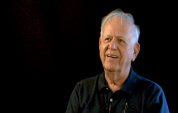5:07 | Beside night patrols, the I&R platoon also maintained a listening post on high ground. Sinclair Stickle sometimes manned this post, observing and reporting and acting as a forward observer for artillery, as well. There were other tasks, like the grim job of picking up the enemy dead. There came a time when he and his buddy were laughing while doing this, an amazing juxtaposition of humor and horror. (Caution: Graphic Material)
Keywords : Sinclair Stickle Korea Intelligence and Reconnaissance (I&R) observation post (OP) BC scope Forward Observer (FO) Chinese bodies artillery fire

With an eye toward the GI Bill, Sinclair Stickle decided to enlist, but he found out that if he volunteered for the draft, it would be a two year commitment instead of four. He entered the Army as a draftee and figured he would have a nice easy tour in Germany because surely the Korean War will be over soon. The drill instructors didn't think so.
Going into Inchon, Sinclair Stickle had to board an LST and land on the beach. This time, it was peaceful. After some culture shock, he headed for the front in the area known as the Iron Triangle. He was assigned to the I&R platoon, intelligence and reconnaissance. This involved night patrols into the enemy lines.
Sinclair Stickle had convinced himself that the Chinese artillery fire would never zero in fast enough to get him, then he saw a first round take out several GIs. His new outlook became one of fatalism. He had no great fear, but he thought he wouldn't make it out alive. One surprising thing, the draftees in his unit did not shirk at all. They got the job done, even though they didn't want to be there.
Sinclair Stickle shares his method for making sure his gun did not jam in a firefight. A little drop of oil. He barely noticed the weather since the winter of 1953 was nothing like the winter of 1950 in the mountains of Korea. Food was a big deal and everybody gathered around when someone got a package from home, hopefully with something nice to offset the WWII era rations.
Others in the 3rd Division had it worse than Sinclair Stickle, he says. He describes two battles that were intensely fought; the Battle of Boomerang and Outpost Harry.
Chinese artillery was zeroed in on the road. The only way you could make it was to floor it and not stop. Sinclair Stickle was in a truck barreling down that road when the shells started. What happened next made him think he'd had it, but the closest he ever came to dying in Korea occurred in a jeep and he wasn't even in combat.
The unit had just moved into reserve position when the order came to move out. They were going back on line in support in case of a Chinese attack. The platoon leader said they were going deep behind enemy lines on patrol soon, but then the armistice was signed and it was over. For Sinclair Stickle, the time between that and his discharge was worse than the war.